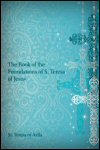Works of St. Teresa of Ávila (8 vols.)
Digital Verbum Edition
Overview
This collection of writings by Teresa of Ávila reflects the many facets of her life. Doctor of the Church, Carmelite nun, saint, mystic, writer, reformer, theologian—Teresa of Ávila impacted the Church in numerous ways during her lifetime and left a powerful legacy for generations of Catholics to come.
Study The Letters of Saint Teresa, which span from 1561 to 1580 AD and offer a glimpse into both her personality and the doctrinal, ecclesiastical, and historical context of this beloved saint’s life. Explore her spiritual meditations in The Interior Castle and The Way of Perfection. Or discover more obscure writings with Minor Works of St. Teresa. Throughout your spiritual journey, you’ll find yourself returning again and again to each cherished volume in this collection.
In the Verbum editions, these volumes are enhanced by amazing functionality. Important terms link to dictionaries, encyclopedias, and a wealth of other resources in your digital library. Perform powerful searches to find exactly what you’re looking for. Take the discussion with you using tablet and mobile apps. Your software brings the most efficient and comprehensive research tools together in one place, so you get the most out of your study.
Take a look at The Works of St. Thomas Aquinas (18 vols.) for more writings from a Doctor of the Church.
Key Features
- Highlights Teresa of Ávila’s meditations on various themes
- Provides insight into an important period of Church history
- Offers a fascinating historical narrative of post-Reformation monastic life
- Presents the wisdom of a modern Doctor of the Church
Product Details
- Title: Works of St. Teresa of Ávila
- Author: Teresa of Ávila
- Volumes: 8
- Pages: 2,787
- Christian Group:
- Christian Group: Catholic
- Resource Type: Collected Works
- Topic: Spirituality
Individual Titles

The Book of the Foundations of S. Teresa of Jesus
- Author: Teresa of Ávila
- Publisher: Thomas Baker
- Publication Date: 1913
- Pages: 489
Spanning 20 years, The Book of the Foundations of S. Teresa of Jesus recounts the history of each convent and monastery St. Teresa founded. A fascinating historical narrative, St. Teresa weaves advice and lessons-learned during the trials and tribulations of each new venture.

The Interior Castle
- Author: Teresa of Ávila
- Translator: John Dalton
- Publisher: T. Jones
- Publication Date: 1866
- Pages: 272
A true masterpiece of spiritual reflection, Interior Castle contains the autobiographical journey of St. Teresa of Ávila. She describes the spiritual life as a castle with many levels. Each individual begins in the lowest level of the castle steeped in the awareness of sin and a passion for spiritual maturity. As her metaphor unfolds, St. Teresa devotes a considerable amount of time to the contemplative life and the soul’s union with God. St. Teresa was plagued by constant illness and pain, making her spiritual meditations a vivid and tangible expression of devotion to Jesus Christ.

The Letters of Saint Teresa, vol. 1
- Author: Teresa of Ávila
- Publisher: Thomas Baker
- Publication Date: 1919
- Pages: 308
The letters of great people are the best revelation of their personality. The Letters of Saint Teresa are sometimes answers to questions asked of the her, some offer a few words of counsel or spiritual exhortation, many are doctrinal, many are strictly ecclesiastical, some are historical and biographical—all provide insight into the mind of this much loved and studied saint. Volume one covers 1561–1576 AD.

The Letters of Saint Teresa, vol. 2
- Author: Teresa of Ávila
- Publisher: Thomas Baker
- Publication Date: 1921
- Pages: 325
The letters of great people are the best revelation of their personality. The Letters of Saint Teresa are sometimes answers to questions asked of the her, some offer a few words of counsel or spiritual exhortation, many are doctrinal, many are strictly ecclesiastical, some are historical and biographical—all provide insight into the mind of this much loved and studied saint. Volume two covers 1576–1577 AD.

The Letters of Saint Teresa, vol. 3
- Author: Teresa of Ávila
- Publisher: Thomas Baker
- Publication Date: 1922
- Pages: 328
The letters of great people are the best revelation of their personality. The Letters of Saint Teresa are sometimes answers to questions asked of the her, some offer a few words of counsel or spiritual exhortation, many are doctrinal, many are strictly ecclesiastical, some are historical and biographical—all provide insight into the mind of this much loved and studied saint. Volume three covers 1577–1580 AD.

The Life of St. Teresa of Jesus
- Author: Teresa of Ávila
- Publisher: David Lewis
- Publication Date: 1916
- Pages: 516
More than a simple autobiography, The Life of St. Teresa of Jesus contains Teresa of Ávila’s thoughts on illness, prayer, the perfect Love of God, hope and faith, commentary on visions, life at the Order, meditations on the soul, and more. Benedict Zimmerman provides an in-depth introduction, as well as summaries and notes for each chapter.

Minor Works of St. Teresa
- Author: Teresa of Ávila
- Publisher: Thomas Baker
- Publication Date: 1913
- Pages: 278
Minor Works of St. Teresa contains:
- 36 poems
- 16 “Exclamations” or meditations of the soul
- St. Teresa’s seven-part Conception of the Love of God
- The Maxims of St. Teresa
- and much more!
Benedict Zimmerman provides an in-depth introduction, as well as summaries and notes for each section.

The Way of Perfection
- Author: Teresa of Ávila
- Publisher: Thomas Baker
- Publication Date: 1919
- Pages: 271
Drawing the title from a phrase she found in the The Imitation of Christ, Teresa of Ávila’s The Way of Perfection consists of meditations on important matters of spiritual life, written as advice and explanation for the women of her reformed convent of the Carmelite Order. Although its aim was to teach the nuns at her convent how to spiritually progress through prayer and Christian meditation, it has inspired generations of those seeking to deepen their inner spiritual life.
About Teresa of Ávila
Teresa of Ávila (1515–1582) is Doctor of the Church and venerated as a saint in the Roman Catholic, Anglican, and Lutheran Traditions. She lived her life in Spain, where she was a Carmelite nun, a mystic, and a theologian. She was cofounder of the Discalced Carmelites along with St. John of the Cross.
Take a look at The Works of St. Thomas Aquinas (18 vols.) for more writings from a Doctor of the Church.
Key Features
- Highlights Teresa of Ávila’s meditations on various themes
- Provides insight into an important period of Church history
- Offers a fascinating historical narrative of post-Reformation monastic life
- Presents the wisdom of a modern Doctor of the Church
Product Details
- Title: Works of St. Teresa of Ávila
- Author: Teresa of Ávila
- Volumes: 8
- Pages: 2,787
- Christian Group: Catholic
- Resource Type: Collected Works
- Topic: Spirituality
About Teresa of Ávila
Teresa of Ávila (1515–1582) is Doctor of the Church and venerated as a saint in the Roman Catholic, Anglican, and Lutheran Traditions. She lived her life in Spain, where she was a Carmelite nun, a mystic, and a theologian. She was cofounder of the Discalced Carmelites along with St. John of the Cross.